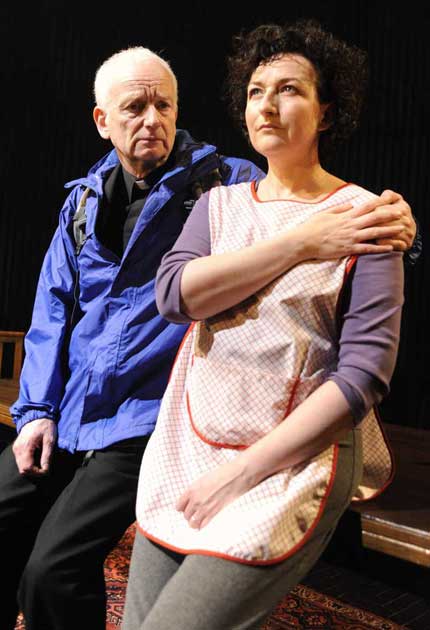Be Near Me, Donmar Warehouse, London
A forbidden love fails to smoulder

Your support helps us to tell the story
From reproductive rights to climate change to Big Tech, The Independent is on the ground when the story is developing. Whether it's investigating the financials of Elon Musk's pro-Trump PAC or producing our latest documentary, 'The A Word', which shines a light on the American women fighting for reproductive rights, we know how important it is to parse out the facts from the messaging.
At such a critical moment in US history, we need reporters on the ground. Your donation allows us to keep sending journalists to speak to both sides of the story.
The Independent is trusted by Americans across the entire political spectrum. And unlike many other quality news outlets, we choose not to lock Americans out of our reporting and analysis with paywalls. We believe quality journalism should be available to everyone, paid for by those who can afford it.
Your support makes all the difference.La-dee-bloody-da! That sums up the antiphony of the two sets of voices in Be Near Me, though the expletive actually used is a shorter one. In the black togs, Father David, a middle-aged Catholic priest devoted to Delius, Tennyson, and French cuisine. In the football shirt, Mark, a fifteen-year-old whose interests are drink, drugs, and trouble. Their relationship, in a Scottish town left stranded and gasping by shifts in the economy, ends with one fond kiss that puts Father David on trial for "sexual assault". But the tensions and ironies are flattened by a play so elliptical and understated that the characters and their dilemmas scarcely seem to exist.
The fault does not lie with Ian McDiarmid's deft adaptation, but with Andrew O'Hagan's precious, wispy novel, full of such lace-hanky aperçus as "Memory is a kind of friendship" and "A man cannot choose whom to love". McDiarmid has excised the drippiest bits, but compression alone has not created intensity. Father David is still bland and smiley, hardly a man whose homosexual feelings, buried for more than 30 years, now threaten to rise up and destroy him. (Nor does McDiarmid's performance, all sashaying and simpering and patting his back hair, convince us he has repressed his nature.) The violence of the story happens offstage: When the priest reads, with no expression, the text message "They've burned down the rectory," the right response, given the emotionally damped-down atmosphere, seems to be "Oh, dear, how horrid."
The object of Father David's affections is even more insubstantial, a compound of prejudice and profanity. We don't see the priest changing Mark's life, or even making him question it, so there is no sense of loss when the boy betrays his friend. But that friendship is implausible and contrived – what is Mark getting out of it? Why does he want a priest along when he is with his hot-to-trot girlfriend? Nor is the brutalised town, where the only culture left is sectarian hatred, evoked beyond a few depressing reactions – the locals laugh when Father David uses such posh words as "perhaps" or "apparently."
Director John Tiffany, of Black Watch (the play is a collaboration between the Donmar and the National Theatre of Scotland), tries to supply a sense of the community and of Father David's blindness to danger with periodic choruses of threatening songs. But this brisk and splendidly cast production (in particular, Jimmy Yuill as the priest's bishop and Colette O'Neil as his jolly, competent mother – who looks the same age as her son) never overcomes the problem of a tale that is constantly retreating from its subjects.
The fact that the tough, strapping Mark, just a few months after being considered in law a vulnerable child, is old enough to give his life to the army, passes with only the tiniest shrug at its absurdity.
The greatest absence of all is the central concern of a priest's life. While Father David is reproved for inadequate "pastoral care," it's not lightweight social work that's missing so much as his role as an intermediary between God and man. Was the church ever anything more to him than a place to hide? (A brief, phlegmatic mention of an adolescent love affair suggests this.) Father David wears his shame as lightly as he does his faith, but we are left feeling that he would not have been struck down had he but served his God with half the zeal he served sole bonne femme.
To 14 March, then touring. ( www.donmarwarehouse.com 0870 060 6624)
Join our commenting forum
Join thought-provoking conversations, follow other Independent readers and see their replies
Comments